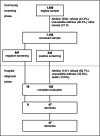The impact of education as a proxy for lifestyle habits on reducing the association with dementia prevalence in the Southern Region of Brazil
- PMID: 39507227
- PMCID: PMC11535170
- DOI: 10.1002/agm2.12362
The impact of education as a proxy for lifestyle habits on reducing the association with dementia prevalence in the Southern Region of Brazil
Abstract
Objectives: This study aimed to investigate the prevalence of dementia among older adults from Florianópolis, in the Southern Region of Brazil.
Methods: Data were originally drawn from the Epifloripa Aging Cohort Study, a representative and community-based survey designed to evaluate older people's health. This cross-sectional study was conducted in two phases: the community-screening phase, in which the Mini-Mental State Examination and a multifunctional scale were administered to older subjects and close informants, respectively; and the hospital-diagnosis phase, when the Cambridge Examination and the National Institute on Aging criteria were used. Adjustment for screening accuracy was made in order to estimate dementia prevalence.
Results: Of 1184 subjects evaluated in the community, 243 were screened for the diagnosis phase, in which 47 were identified with dementia, resulting in a crude prevalence of 4.5% (95% CI: 3.241-5.758) and an estimated prevalence of 9.2% (95% CI: 7.446-10.954). Dementia was associated with older ages, lower education levels, and the presence of stroke. Mild alcohol use (in comparison with no alcohol use), community-group practice, internet use and a higher level of physical activity, rather than education, decreased the odds ratio for dementia. Education was directly associated with these lifestyle habits.
Conclusions: Prevalence was lower than that in previous studies in the country, and multivariate analysis reinforced the importance of lifestyle in preventing cognitive disorders in the older population.
Keywords: dementia; education; lifestyle; older people; prevalence.
© 2024 The Author(s). Aging Medicine published by Beijing Hospital and John Wiley & Sons Australia, Ltd.
Conflict of interest statement
The authors report there are no competing interests to declare.
Figures
Similar articles
-
High prevalence of dementia in a community-based survey of older people from Brazil: association with intellectual activity rather than education.J Alzheimers Dis. 2012;32(2):307-16. doi: 10.3233/JAD-2012-120847. J Alzheimers Dis. 2012. PMID: 22785401
-
Screening for Cognitive Impairment in Older Adults: An Evidence Update for the U.S. Preventive Services Task Force [Internet].Rockville (MD): Agency for Healthcare Research and Quality (US); 2013 Nov. Report No.: 14-05198-EF-1. Rockville (MD): Agency for Healthcare Research and Quality (US); 2013 Nov. Report No.: 14-05198-EF-1. PMID: 24354019 Free Books & Documents. Review.
-
Assessment of cognitive function among adults aged ≥ 60 years using the Revised Hasegawa Dementia Scale: cross-sectional study, Lao People's Democratic Republic.Health Res Policy Syst. 2022 Nov 29;20(Suppl 1):121. doi: 10.1186/s12961-022-00919-x. Health Res Policy Syst. 2022. PMID: 36443883 Free PMC article.
-
Prevalence of cognitive impairment no dementia in a rural area of Northern China.Neuroepidemiology. 2014;42(4):197-203. doi: 10.1159/000360138. Epub 2014 Apr 15. Neuroepidemiology. 2014. PMID: 24751796 Free PMC article.
-
Screening for Cognitive Impairment in Older Adults: An Evidence Update for the U.S. Preventive Services Task Force [Internet].Rockville (MD): Agency for Healthcare Research and Quality (US); 2020 Feb. Report No.: 19-05257-EF-1. Rockville (MD): Agency for Healthcare Research and Quality (US); 2020 Feb. Report No.: 19-05257-EF-1. PMID: 32129963 Free Books & Documents. Review.
References
LinkOut - more resources
Full Text Sources



